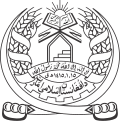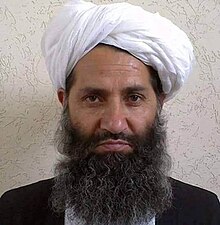The Supreme Leader of Afghanistan[3] (Pashto: د افغانستان مشر, romanized: Də Afġānistān Damshīr, Dari: رهبر افغانستان, romanized: Rahbar-e Afghānistān), officially the Supreme Leader of the Islamic Emirate of Afghanistan[4][5][note 1] and also styled by his religious title Amir al-Mu'minin (Arabic, lit. 'Commander of the Faithful'), is the absolute ruler, head of state, and national religious leader of Afghanistan, as well as the leader of the Taliban.[10][11][12] The supreme leader wields unlimited authority and is the ultimate source of all law.[12][13][14]
| Supreme Leader of the Islamic Emirate of Afghanistan | |
|---|---|
 | |
| Leadership of the Islamic Emirate | |
| Style | |
| Type | Supreme leader |
| Status | Head of state |
| Member of | Leadership Council |
| Residence | None official[2] |
| Seat | Kandahar |
| Appointer | Leadership Council |
| Term length | Life tenure |
| Constituting instrument | 1998 dastur |
| Precursor | President of Afghanistan |
| Inaugural holder | Mullah Omar |
| Formation | 15 August 2021 (current form) 4 April 1996 (originally) |
| Deputy | Deputy Leader |
| Salary | ؋228,750 monthly |
The first supreme leader, Mullah Omar, ruled Afghanistan from 1996 to 2001 before his government was overthrown by the United States and he was forced into exile. The current supreme leader is Hibatullah Akhundzada, who assumed office in exile during the Taliban insurgency on 25 May 2016, upon being chosen by the Leadership Council, and came to power on 15 August 2021 with the Taliban's victory over U.S.-backed forces in the 2001–2021 war. Since coming to power, Akhundzada has issued numerous decrees that have profoundly reshaped government and daily life in Afghanistan by implementing his strict interpretation of the Hanafi school of Sharia law.
The supreme leader appoints and manages the activities of the prime minister and other members of the Cabinet, as well as judges and provincial and local leaders.[12]
History
The office was established by Mullah Mohammed Omar, who founded both the Taliban and the original Islamic Emirate of Afghanistan in the 1990s. On 4 April 1996, in Kandahar, followers of Omar bestowed upon him the title Amir al-Mu'minin (أمير المؤمنين), meaning "Commander of the Faithful", as Omar had donned a cloak taken from its shrine in the city, asserted to be that of the Islamic prophet Muhammad.[15][16] The Taliban seized control of Kabul on 27 September 1996, ousting President Burhanuddin Rabbani and installing Omar as the country's head of state.[17]
The Taliban views the Quran as its constitution. However, it approved a dastur, a document akin to a basic law, in 1998, which proclaimed Omar supreme leader but did not outline a succession process. In 1996 interview, Wakil Ahmed Muttawakil stated that the Amir al-Mu'minin is "only for Afghanistan", rather than a caliph claiming leadership of all Muslims worldwide.[18][19]
Following the September 11 attacks and the United States invasion of Afghanistan in 2001, Omar was deposed and went into hiding in Zabul Province, and the presidency was restored as Afghanistan's head of state. The Taliban reorganized for an insurgency in 2002, based out of Pakistan. They continued to claim Omar as their supreme leader, though he had little involvement in the insurgency, having turned over operational control to his deputies.[20] Though the Taliban continued to maintain the office of the supreme leader in exile, it had no diplomatic recognition.
Following its offensive in 2021, the Taliban recaptured Kabul on 15 August and restored the supreme leader as Afghanistan's head of state.[21][22][23][11]
Selection
This section needs expansion. You can help by adding to it. (August 2021) |
The supreme leader is appointed by the Leadership Council.[24]
Powers and duties
This section needs expansion. You can help by adding to it. (August 2021) |
Under Omar, the leader held absolute power, and the Taliban's interpretation of Sharia was entirely his decision.
Under the 1998 draft constitution of the first Islamic Emirate, the Leader of the Faithful would appoint justices of the Supreme Court.[25]
Under the current government however, the Emir has final authority on political appointments, as well as political, religious, and military affairs. The Emir carries out much of his work through the Rabbari Shura, or the Leadership Council (which he chairs[26]), based in Kandahar, which oversees the work of the Cabinet, and appointment of individuals to key posts within the cabinet.[27]
However, in a report from Al Jazeera, the Cabinet has no authority, with all decisions being made confidentially by Akhundzada and the Leadership Council.[28] The supreme leader receives the highest government salary in the reinstated Islamic Emirate, at 228,750 Afghan afghanis monthly.[29]
List of supreme leaders
- Status
| No. | Name (Birth–death) |
Additional position(s) held | Term of office (including in exile) | Ref. | ||
|---|---|---|---|---|---|---|
| Took office | Left office | Time in office | ||||
| 1 | Mullah Mohammed Omar (died 2013) |
– | 4 April 1996 Ruler of Afghanistan from 27 September 1996 |
23 April 2013 Ruler of Afghanistan until 13 November 2001 |
17 years, 19 days Ruler of Afghanistan for 5 years, 47 days |
[15][30][31] |
| 2 | Mullah Akhtar Mansour (1960s–2016) |
First Deputy Leader (2010–2015) | 23 April 2013 | 29 July 2015 | 2 years, 97 days[note 2] | [32][33][34] |
| – | 29 July 2015 | 21 May 2016 | 297 days | |||
| 3 | Sheikh al-Hadith Mullah Mawlawi Hibatullah Akhundzada |
First Deputy Leader (2015–2016) and Chief Justice (2001–2016) |
21 May 2016 | 25 May 2016 | 4 days | [35][36][11] |
| – | 25 May 2016 Ruler of Afghanistan since 15 August 2021 |
Incumbent | 8 years, 173 days Ruler of Afghanistan for 3 years, 91 days | |||
Timeline

Deputy Leader
| Deputy Leader of the Islamic Emirate of Afghanistan | |
|---|---|
 | |
Incumbents
| |
| Leadership of the Islamic Emirate | |
| Status | Deputy head of state |
| Member of | Leadership Council[37] |
| Reports to | Supreme Leader[38] |
| Seat | Kandahar (Yaqoob)[39] |
| Appointer | Supreme Leader |
| Term length | At the pleasure of the supreme leader |
| Precursor | Vice President of Afghanistan |
| Inaugural holder | Mohammad Rabbani[40] |
| Formation | 15 August 2021 (current form) 4 April 1996 (originally) |
| Succession | Acting (in order of deputy rank)[32][41] |
The deputy leader of Afghanistan, officially the deputy leader of the Islamic Emirate of Afghanistan (Pashto: د افغانستان د اسلامي امارت مرستیال,[42][romanization needed] Dari: معاون امارت اسلامی افغانستان[43][romanization needed]), is the deputy emir of the Taliban, tasked with assisting the supreme leader with his duties.[44][38] All three supreme leaders of the Taliban have had deputies, with the number of deputies fluctuating between one and three.[45] Akhundzada has three deputies: Sirajuddin Haqqani, Mullah Yaqoob, and Abdul Ghani Baradar. Haqqani was first appointed as a deputy leader by Akhtar Mansour in 2015, and was retained by Akhundzada. Upon assuming office in 2016, Akhundzada appointed Yaqoob, a son of Mullah Omar, as a second deputy. Akhundzada appointed Baradar as a third deputy in 2019.[46]
Since the 2021 return of power to the Taliban, Akhundzada has grown more isolated and he has primarily communicated through his three deputies rather than holding meetings with other Taliban leaders. The deputies' exclusive access to Akhundzada has grown their power.[13][47]
See also
Notes
- Mullah Omar's death was concealed from the public and most of the Taliban. The same day news of Omar's death became public, Mansour was elected Supreme Leader.
References
Wikiwand in your browser!
Seamless Wikipedia browsing. On steroids.
Every time you click a link to Wikipedia, Wiktionary or Wikiquote in your browser's search results, it will show the modern Wikiwand interface.
Wikiwand extension is a five stars, simple, with minimum permission required to keep your browsing private, safe and transparent.




